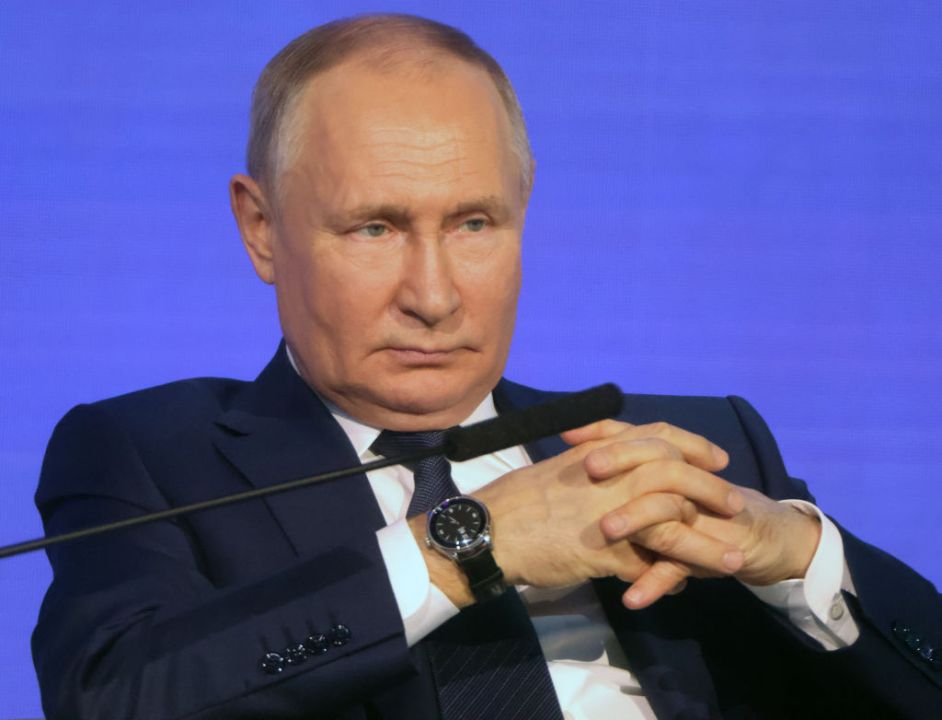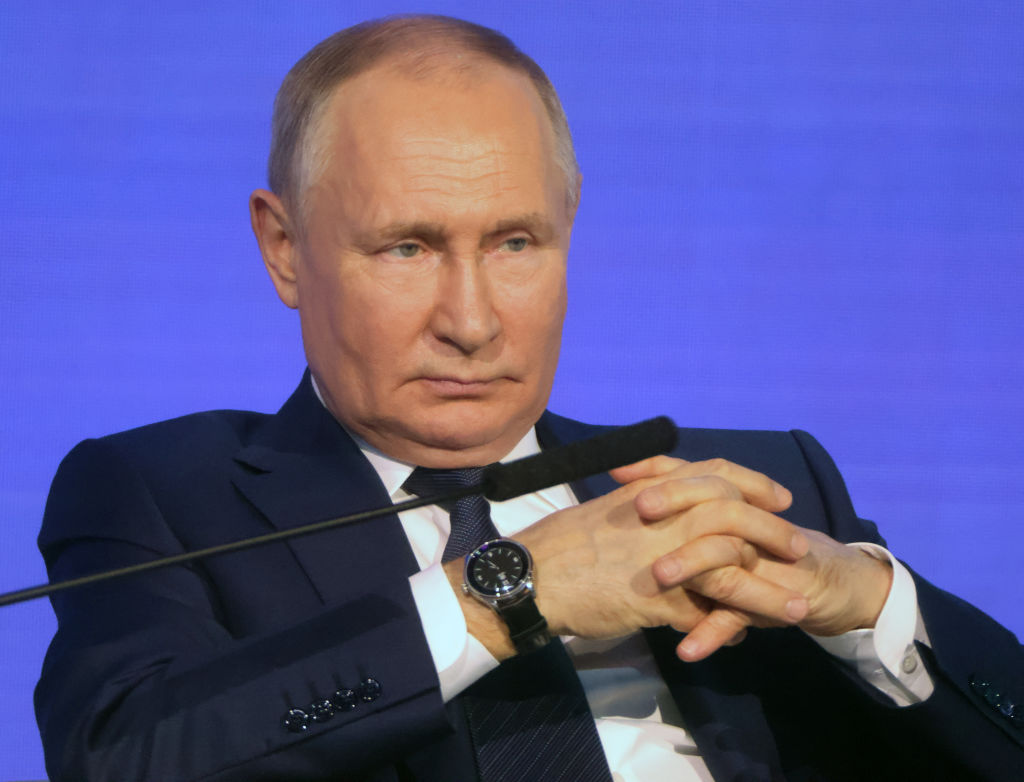Loyalty cards in the West are used by supermarket chains to influence our shopping habits. They are fortunately absent from our politics, and we can freely speak our minds about public affairs, history and morality. In Russia it is different. The Russian TASS news agency reported on Wednesday that the Ministry of Internal Affairs has prepared a mandatory ‘loyalty agreement’ for all foreigners entering Russia.
Our supermarkets do not demand a personal declaration of loyalty, and our governments make no such requirement of visiting foreigners. But travellers to Russian parts will run into as yet unspecified trouble if they are thought to engage in ‘distorting’ the record of Soviet people in the defence of its Fatherland between 1941 and 1945. Other matters too are to be ruled unquestionable. The Kremlin’s traditionalist orientation in policies on the family and sexuality will be treated as sacrosanct. There will also be a prohibition on suggesting the desirability of changing pieces of Russian legislation.
Fear of what visitors from abroad might say about the past is nothing new. In Soviet times, most important archives were guarded from international scrutiny. Even Russians could not see them, and contact with foreigners was heavily patrolled. I have a painful memory of my time in the mid-1970s in a Leningrad student hostel when sharing a room with a Russian postgraduate. After weeks of forming a bond of mutual trust, we exchanged views on the USSR. It all ended badly. My room mate was ejected from the hostel and when I chanced upon him a fortnight later, he was almost too scared to exchange greetings. Evidently some kind of surveillance had caught us out, and his eagerness to hear about conditions in the West was judged injurious to the communist state order.
Even after the fall of communism official sensitivity about what a foreigner might write about the Great Patriotic War remained. In December 1993, I was working in Moscow with my colleague Rudolf Muhs on wartime archives. We dredged up plentiful new material. I vividly remember the records of Scottish POWs liberated from German camps by the Red Army and interrogated by the NKVD. But one day we returned after lunch to the Special Archive to be to told that our access permission had been withdrawn.
We felt we had stepped through Lewis Carroll’s looking glass when hearing that the files that we had seen with our own eyes – and from which we had made copious notes – simply did not exist. Protest and persuasion proved useless. We had tumbled down the rabbit hole of Russian politics at a time when President Boris Yeltsin had suffered disappointment in the first post-communist parliamentary election. Running scared of his nationalist critics, Yeltsin’s administration began to choke off the freedom of historical exploration.
The past in Russia has long been plasticine in official hands and certain themes became a state monopoly under President Vladimir Putin. In the early 2000s, the heads of the two main history institutes in Moscow were summoned to meet him. He asked why one of them had allowed a researcher to publish a book which mentioned that the Soviet Army had conquered the former Baltic states in 1944. He said the word ‘conquest’ had to be replaced with ‘liberation’. Against those who wrote that Estonians, Latvia and Lithuania wanted freedom equally from both the USSR and Nazi Germany, the message should be that Stalin had brought them peace and liberty.
Putin has continued his march across history’s terrain. In July 2022, after his invasion of Ukraine, he launched a campaign to rewrite centuries of relations between Russians and Ukrainians. His essay contended that Ukraine had felt a constant centripetal impulse – and the centre in question was the Russian capital. The Russians and Ukrainians in Putin’s view are a single people. He claims that the prevailing disjunction stems exclusively from malign activity by Ukrainian neo-Nazis backed by western powers.
In the current war the Russian authorities have persecuted those who call it a war rather than a ‘special military operation’. Protest is harshly suppressed. The father of a young girl who painted an anti-war picture fled the country after his daughter was seized and deposited to a children’s home. Tracked down by his mobile phone to Belarus, he has been extradited to Russia.
If the Ministry of Internal Affairs successfully pilots its sinister loyalty agreement through the State Duma, visitors to Russia will be placed under the weight of legal sanctions. The range of forbidden topics stretches far beyond the war. Foreigners on Russian soil could run into trouble for expressing a positive opinion about same-sex marriage or homosexual rights. Although the full legislative draft has yet to be published, its reported clauses include one that puts a ban on calls for anything that might cause ‘damage to Russia’.
This deliberately opaque phrase would open the gates for Putin’s ministers and militiamen to apply punishment with total arbitrariness. Russia’s international tourist trade is in the doldrums and such a law would permanently furl the sails for its restoration. For example, a British army WWII veteran staying at a Russian hotel could find a militiaman knocking on his door for stressing that the United Kingdom was engaged in war against Hitler nearly two years before the USSR.
I make this suggestion with some confidence because a furious dispute broke out when I made such a comment in 1989 at an academic conference in Moscow. One of my critics, a senior Russian historian, retorted that, if wasn’t for the Red Army, Churchill’s Britain would have been overwhelmed and I would have been brought up wearing a swastika on my shirtsleeve. The animated reaction was understandable. The historian had himself fought at the Eastern front and the USSR’s contribution to victory over the Third Reich was truly crucial even though he completely overlooked the importance of America’s entry into the world war at the end of 1941.
An argy bargy between scholars is one thing and a new law on politics, history and morality is entirely another. Since annexing Crimea in 2014, and invading the rest of Ukraine in 2022, Putin has placed Russia in an informational quarantine of ever greater severity – but this affected only his fellow citizens. The Ministry of Internal Affairs presently aims to extend the process to foreign travellers with a ban on them spreading infection by expressing ideas that conflict with Putin’s propaganda.
Not even Stalin used formal legal means to enforce this degree of ideological insulation. There was no need, of course, because foreigners knew what happened to people who criticised the Soviet order. This is still the case in Russia today, and Putin knows it. The number of foreign visitors, including scholars, has plummeted, and the few who travel there would be ill-advised to say anything that annoys the authorities. Putin has for years advocated the objective of economic self-sufficiency for his country. He has not yet achieved the cultural autarky that would render Russia independent of foreign media and ideas. But he is heading in that direction.
The West’s relations with Russia are worse than at any time since the late Stalin period or the Cuban missiles crisis. Putin, like Stalin, has decided that his country can do better without friendly linkages to North America and Europe. It is counterproductive geopolitics on his part. Even if his draft law is abandoned or watered down, he is turning his country into a prison fortress. Not for the first time, the Russian people deserve liberation and, whatever foreign businessmen, migrant workers or tourists may say there, only Russians can bring it about.







Comments